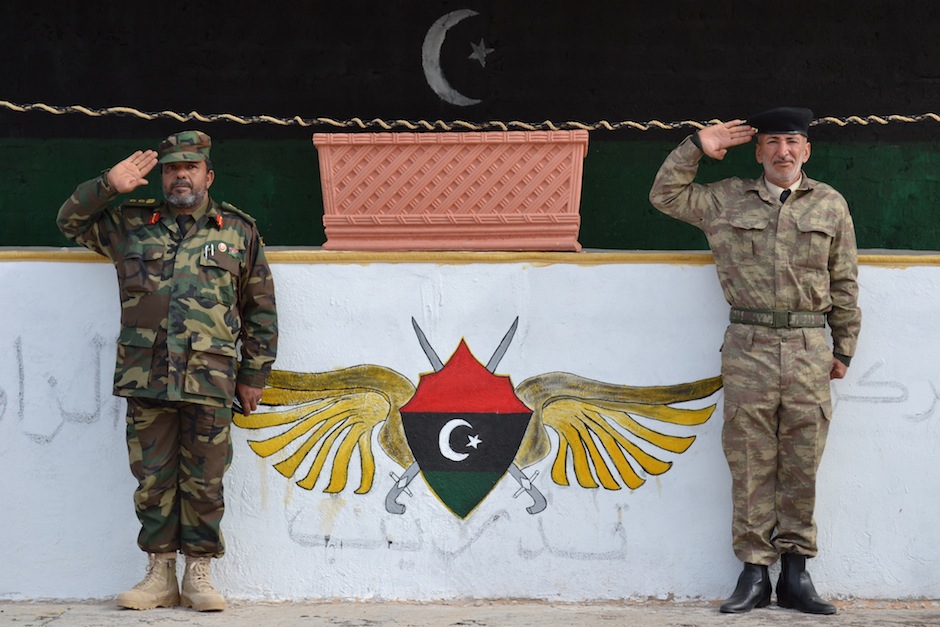By Mathieu Galtier.

Tripoli, 24 January 2013:
Nearly two years after the beginning of the Revolution, the Libyan authorities want a united army. . . .[restrict]The success of that depends on one main issue, turning thuwars into regular, proper soldiers. The first training centre was set up at Zawia, 45 kilometres west of Tripoli, in November 2011. The will is strong but the lack of means is great.
Fifty hectares and almost nothing on them: weeds, rubbish on the ground, a cracked court on which soldier apprentices learn how to parade, and green painted buildings. The military camp does not look fancy, but it is a symbol of the new Libya. It is here that the first thuwars received their two-month training to be officially considered as soldiers of the Libyan army. So far, about 2,600 soldiers have been “graduated”.
General Mustafa Salah Hussein Al-Mazouri is the head of Zawia camp. He defected from the Qaddafi army to join the revolution. During the first weeks, he used to learn how to handle weapons such as AK47s and RPGs. “But the time of thuwars is over now, the country needs to unify the army”, General Al-Mazouri says.
“Being a soldier is easy”
Since the end of the revolution, security in Libya has largely been enforced by the thuwar brigades. Some, however, have been accused of creating disorders and pursuing their own interests rather than in those of Libya. The task of the training camp has thus been to “make civilians reliable soldiers”, Masouri points out. Sixty-five trainers are working to fulfill this mission.
The trainee is subject to a strict timetable. The day starts with a one-hour parade at 6.30 am. After breakfast, there is marching for another hour. In the afternoon, he has shooting lessons and then takes part in team sports such as football or basketball to consolidate team spirit.
Every Thursday, an eight-kilometre race is organised. The winner receives a diploma. “It is very important for the men and their families. It shows that the army is paying attention to the individual and so the army deserves to have his attention”, Mazouri explains. These activities seem rather easy for thuwars who experienced appalling living conditions during the liberation struggle. “Nothing is difficult in the training camp. I left my wife and my four children to fight Qaddafi. During the revolution, I couldn’t sleep. I spent seven months without sleeping. So, being a soldier is easy”, Marwan Mohamed Mordiya tells the Libya Herald.
Advices from a sheikh
The head of the training camp knows the specific backgrounds of the men. He prefers to lay stress on other more atypical subjects taught in his “school”. Once a week, a sheikh comes to talk and gives advices to thuwars. “He teaches them that Islam and the Quran say it is a duty to protect their country”, the general says. Above all, the “students” have to know military law. Before the war, the rebels were rank-and-file civilians. Most of them had not even a job when they decided to join the revolution. “When they arrive at the camp, they know how to use pistols, rifles and, some of them, heavy weapons. But they know nothing about military discipline and the rules of the army”, Ali Baaby details. The 55-year-old former army officer is now a professor of discipline. Thus, before using guns, the soldier-to-be has to write down all the pieces of the gun and the steps to dismantle it.
3.30pm, end of the day
At 3.30pm, it is briefing time. The officials note the absences, those who are sick, and others who for whatever reason are not there. The training camp has a major failing: there are no dormitories. There were destroyed by NATO and not replaced. As a result, the thuwars are free until 6.30 am the next day or later. Those who lived outside Zawia have the permission to arrive at 7.30 am. Definitively, not the best way to instill in minds the discipline. What happen to those who are absent? Nothing. The training camp imposes no sanction. Those in charge prefer to support those who are take part rather than penalise the bad elements.
Moreover, the camp received many more applications than it can cope with. Candidates have to be Libyan citizens, male, aged between 18 and 45, and have to bring a letter from a truthful witness that he was a thuwar or, at least, he did not fight for Qaddafi’s army during the revolution. After the two month training course, he has two choices: enter the military — either the navy, army or air force) or to return to civilian life. But if the latter, they remain reserve soldiers, so the army can call them up when needed.
Thuwars use their own guns
Ahmed Mohamed Ahmed decided to join the army after his training. Under the former regime, despite being a graduate, he had no job. For him, becoming a soldier after training was the obvious choice, especially as a soldier is paid some LD 1,000 monthly (LD 600 during the training) and he has bonuses such as insurance for all his family. However, Ahmed plans to quit as soon as he works out what he really wants to do.
Prime Minister Ali Zeidan says that security is “top priority” and that thuwars should join the army. General Mustafa Salah Hussein Al-Mazouri agrees with this. But so far, he has received no help to modernise his training camp. It is reported that those in charge have even had to ask the thuwars to bring their own guns for shooting practice because there are insufficient at the camp.
Right now, the centre has no trainees. General Mustafa Salah Hussein Al-Mazouri is waiting the government gives him the authorisation. In one year and two months, the camp has welcomed though its gates just three groups with a total of 2,600 trainees.
The National Liberation Army had 64,000 thuwars during the revolution.
Follow Mathieu Galtier on Twitter [/restrict]








